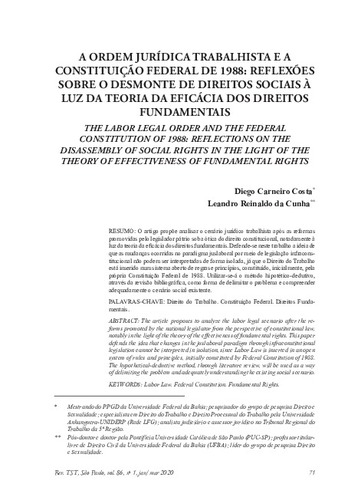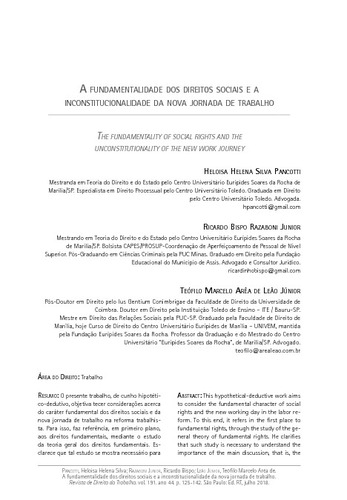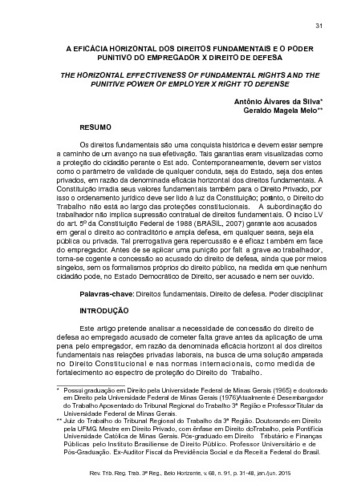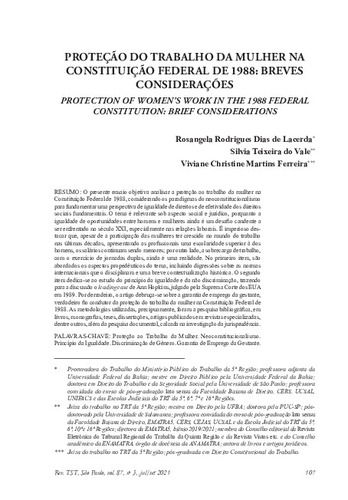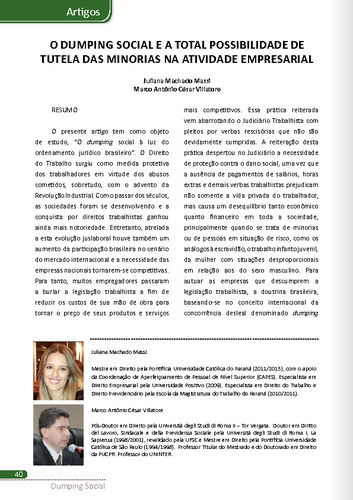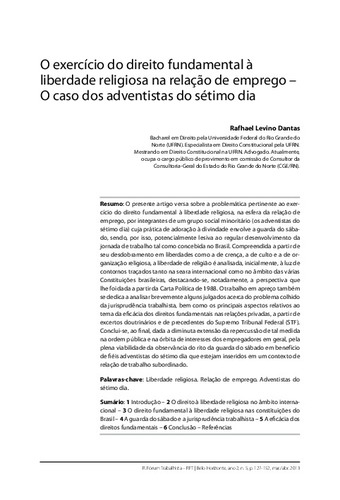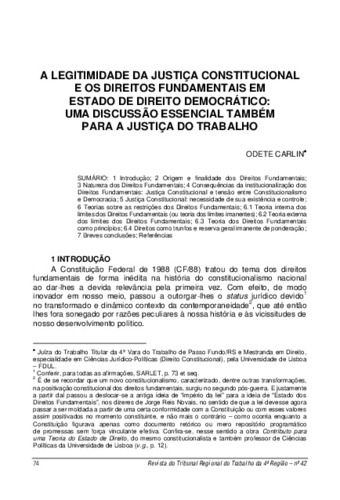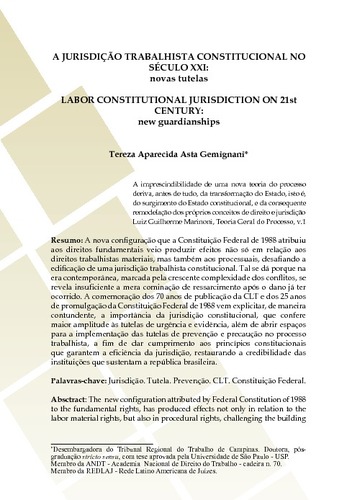Artigo de periódico
A ordem jurídica trabalhista e a Constituição federal de 1988: reflexões sobre o desmonte de direitos sociais à luz da teoria da eficácia dos direitos fundamentais
| dc.contributor.author | Costa, Diego Carneiro | |
| dc.contributor.author | Cunha, Leandro Reinaldo da | |
| dc.date.accessioned | 2020-08-06T16:04:50Z | |
| dc.date.available | 2020-08-06T16:04:50Z | |
| dc.date.issued | 2020-03 | |
| dc.identifier.citation | COSTA, Diego Carneiro; CUNHA, Leandro Reinaldo da. A ordem jurídica trabalhista e a Constituição federal de 1988: reflexões sobre o desmonte de direitos sociais à luz da teoria da eficácia dos direitos fundamentais = The labor legal order and the Federal Constitution of 1988: reflections on the disassembly of social rights in the light of the theory of effectiveness of fundamental rights. Revista do Tribunal Superior do Trabalho, São Paulo, v. 86, n. 1, p. 71-88, jan./mar. 2020. | pt_BR |
| dc.identifier.uri | https://hdl.handle.net/20.500.12178/175670 | |
| dc.description.abstract | [por] Analisa o cenário jurídico trabalhista após as reformas promovidas pelo legislador pátrio sob a ótica do direito constitucional, notadamente à luz da teoria da eficácia dos direitos fundamentais. Defende-se neste trabalho a ideia de que as mudanças ocorridas no paradigma juslaboral por meio de legislação infraconstitucional não podem ser interpretadas de forma isolada, já que o Direito do Trabalho está inserido num sistema aberto de regras e princípios, constituído, inicialmente, pela própria Constituição Federal de 1988. Utilizar-se-á o método hipotético-dedutivo, através da revisão bibliográfica, como forma de delimitar o problema e compreender adequadamente o cenário social existente. | pt_BR |
| dc.description.abstract | [eng] The article proposes to analyze the labor legal scenario after the reforms promoted by the national legislator from the perspective of constitutional law, notably in the light of the theory of the effectiveness of fundamental rights. This paper defends the idea that changes in the juslaboral paradigm through infraconstitutional legislation cannot be interpreted in isolation, since Labor Law is inserted in an open system of rules and principles, initially constituted by Federal Constitution of 1988. The hypothetical-deductive method, through literature review, will be used as a way of delimiting the problem and adequately understanding the existing social scenario. | pt_BR |
| dc.description.tableofcontents | A racionalidade neoliberal e o desmonte de direitos trabalhistas -- A ordem constitucional trabalhista no Brasil: direitos trabalhistas como cláusulas pétreas, o princípio da proteção e da vedação ao retrocesso social -- Direitos trabalhistas como direitos fundamentais: a vinculação do legislador pátrio aos direitos sociais previstos constitucionalmente -- Direitos trabalhistas como direitos fundamentais: o princípio da proporcionalidade como parâmetro para limitação dos direitos sociais trabalhistas | pt_BR |
| dc.language.iso | pt_BR | pt_BR |
| dc.relation.ispartof | Revista do Tribunal Superior do Trabalho: vol. 86, n. 1 (jan./mar. 2020) | pt_BR |
| dc.subject | Direito do trabalho, aspectos constitucionais, Brasil | pt_BR |
| dc.subject | Direitos e garantias individuais, Brasil | pt_BR |
| dc.subject | Princípio da proteção, Brasil | pt_BR |
| dc.subject | Princípio da proibição do retrocesso social, Brasil | pt_BR |
| dc.subject | Reforma trabalhista, Brasil | pt_BR |
| dc.title | A ordem jurídica trabalhista e a Constituição federal de 1988: reflexões sobre o desmonte de direitos sociais à luz da teoria da eficácia dos direitos fundamentais | pt_BR |
| dc.title.alternative | The labor legal order and the Federal Constitution of 1988: reflections on the disassembly of social rights in the light of the theory of effectiveness of fundamental rights | pt_BR |
| dc.type.genre | Artigo de periódico | pt_BR |
| dc.identifier.rvbisys | 001174104 | |
| dc.relation.ispartoflink | https://hdl.handle.net/20.500.12178/175590 | pt_BR |
Ce document figure dans la(les) collection(s) suivante(s)
-
Artigos9527


